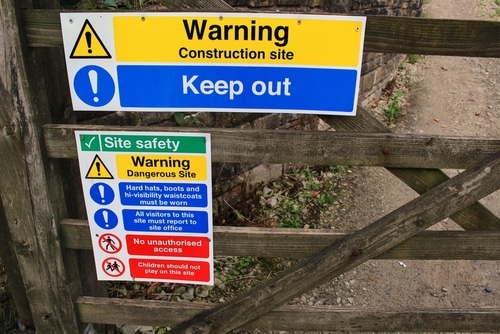In 2022/23, more than half a million employees registered a workplace injury. The majority of these saw no one at fault, with accidents like slips, trips and falls on the same level making up 32% of the most common workplace injuries.
If you’ve experienced an injury at work, there’s lots you and your business can do to prevent future accidents – saving time and money, and promoting happier and more productive staff.
Safety signs
Perhaps the most obvious place to start in preventing workplace injuries – safety signs can
be found in all public spaces. Workplaces with effective safety signage experience on average a 28% reduction in accidents.
The signs come in all shapes and sizes, with different colours displaying different warnings.
But when you’re in the same place day after day, it can become easy to overlook the very
signs keeping you safe. This is known as sign blindness.
The optimum location for the signs is at eye level, or around 78 inches high, to ensure
visibility from a distance.
When starting a new job, it’s a great idea to ensure your tours of the space point out the
safety signs and that the more uncommon signs are explained.
Sign blindness – colours could make all the difference
The colour of a safety sign correlates to the message. This can be helpful to know when
you’re in a fast-paced environment.
Green often shows exits, yellow signs display hazards, danger and caution, and blue often
shows mandatory things or information, such as how to lift correctly.
Some signs, particularly emergency signs, will be photoluminescent.
Signs aside – what else can you do?
Naturally, signs only go so far. They can instruct, warn, and prevent countless injuries, but
even more can be done. From keeping tidy, organising, and having correct posture, to anti-
slip matting and wearing safety equipment – there’s lots to consider when it comes to
health and safety.
Organising and zone classification
Many workers find they’re more effective when the surrounding environment is clear and
organised. No matter the industry, general housekeeping is a vital step in preventing
workplace accidents.
Spill-cleaning kits are a great place to start.
There are also recommended ways to section workplaces into zones, such as ATEX zone
classification in explosive atmospheres.
Zone classification works well for industries requiring warehouses, or other high-risk
workplaces, as it can help to contain more dangerous materials and enhance the safety of
the space.
Labelling hazardous materials is also important. Labels are essentially miniature safety signs – another vital part of all types of workplaces.
The highest-risk workplaces
You may find particular use for spill-cleaning kits in warehouses and construction sites,
which are often where the most workplace-related injuries occur. This doesn’t mean
accidents can’t happen anywhere, but it’s important to take extra precautions in higher-risk
environments. This might include additional training and more frequent health and safety checks.
It’s clear there are lots of precautions you can take to keep yourself and other employees
safe at work. Safety signs are just the beginning. Take a look around your workspace and
note where the signs are – it could save a lot of health and safety headaches.



